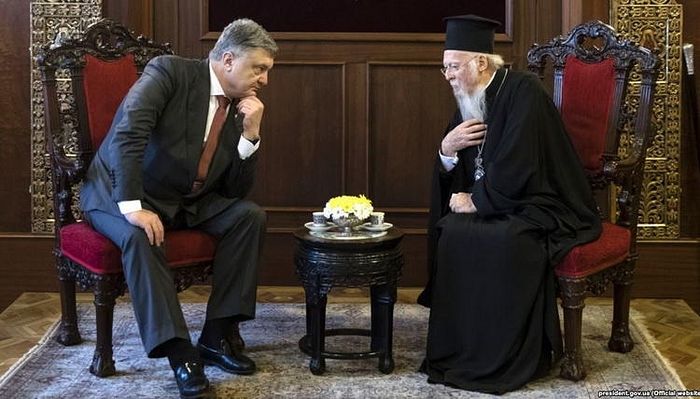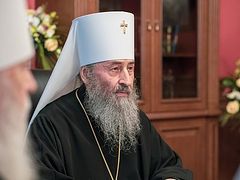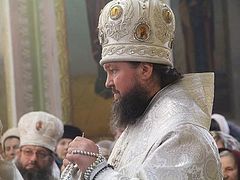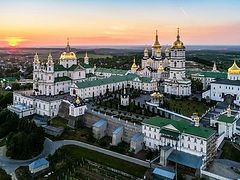Kiev, December 26, 2018
President Petro Poroshenko has yet to publish the agreement on cooperation that he signed with Patriarch Bartholomew in Constantinople on November 3, despite the fact that he was required to do so by Ukrainian law more than a month ago already.
Parliamentary Deputies and media representatives have repeatedly called on Poroshenko to publish the agreement.
However, the Ukrainian site Vesti has learned that an addendum to the cooperation includes a list of Ukrainian churches and monasteries that Poroshenko pledged to transfer to the Patriarchate of Constantinople. The list includes 12 properties altogether, 8 of which are monasteries of the canonical Ukrainian Orthodox Church under the primacy of His Beatitude Metropolitan Onuphry of Kiev and All Ukraine, which has repeatedly protested Constantinople’s reckless and prideful interference in its own internal affairs.
The official site of the Ukrainian Orthodox Church has also ran the story.
According to Vesti’s source, the issue of the transfer is under the control of the presidential adviser Rostislav Pavlenko, who “edits the list taking into account the interests and desires of Bartholomew and his Exarchs. To clarify the situation and find out who is hesitating—Andrei Yurash, the head of the Department of Religions and Nationalities of the the Ministry of Culture, was sent to the western provinces.”
The 12 properties to be transferred (in addition to St. Andrew’s Cathedral in Kiev, which was already transferred by resolution of the Verkovna Rada) are:
-Kiev-Brotherhood Theophany Monastery (in the Kiev-Mogila Academy). It was destroyed by the Bolsheviks in 1919 and one of the Academy buildings stands on its territory now. The Church of the Holy Spirit (“Kiev Patriarchate” [KP]) was rebuilt in 2007. The library is especially valuable;
-Holy Ascension-Florovsky Convent in Kiev (UOC);
-Mezhigorye Holy Transfiguration Monastery, Novo Petrovtsi village, Kiev Province. The monastery was destroyed and in 1933 a country government residence was built on its site;
-Holy Dormition Church in Lvov (“Ukrainian Autocephalous Orthodox Church”);
-Manyava Skete, village of Manyava, Ivan-Frankovsk Province (KP);
-Holy Trinity Convent, Korets, Rivne Province (UOC);
-Holy Transfiguration Monastery, Novgorod-Seversky, Chernigov Province (UOC);
-Molchensky Nativity of the Theotokos Convent, Glukhov, Suma Province (UOC);
-Nativity of the Most Holy Theotokos-Glinsk Hermitage, Sosnovka, Suma Province (UOC);
-Elevation of the Cross Convent, Poltava (UOC);
-St. Elijah Monastery, Odessa (UOC);
-St. Panteleimon’s Monastery, Odessa (UOC).
Several of the monasteries are home to revered relics and wonderworking icons.
Archpriest Alexander Bakhov, the head of the UOC’s legal department, explained that most of the churches and monasteries in the list are owned by the state and were transferred for use to the UOC, though some of them are owned by the Church.
“In any case,” Fr. Alexander said, “for the deprivation of property rights or the termination of contracts on the right to use/lease them, there must be grounds—such as, for example, Law No. 5309 [on the renaming of churches— OC].”
Poroshenko signed Bill No. 5309 into law on Saturday, which is widely considered merely a pretext to seizing properties from the canonical Church.
However, from a legal point of view, the question of transferring churches and monasteries to Constantinople, i. e., to a foreign resident, looks doubtful, lawyer Rostislav Kravets said. “This is contrary to the constitution of Ukraine; I’m sure that soon after the publication of this information, deputies will file and appeal to the Constitutional Court to have it canceled,” he said, adding that the separation of Church and state is called for in the constitution.
“From a legal point of view, a document on the transfer of something to the Ecumenical Patriarchate is not worth the paper it’s written on,” Kravets said.
Fr. Alexander has suggested that, in addition to forcing the renaming of churches, the Rada will adopt another act on the renegotiating of leases, and then the communities will simply be told that, as representatives of an aggressor country, they have lost the right to renegotiate.”
The question of the Kiev Caves and Pochaev Lavras is separately stipulated. Yurash explains that they are in state ownership and that such objects of national importance are not transferred to anyone. The Lavras were given to the UOC for use for 50 years, “and if it is clear that there were violations in the transfer of the lavras for lease, that can be grounds for revising the contract.”
Follow us on Facebook!







